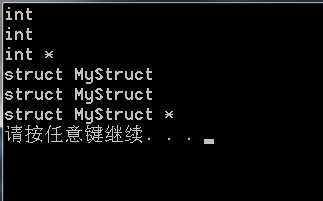c++ type_info and typeid
c++ type_info and typeid
typeid
关键字typeid提供了对一个对象查询类型的功能。 该关键字和dynami_cast一起提供了c++的RTTI(rumtime type identification)支持.
struct MyStruct
{
int i;
};
int _tmain(int argc, _TCHAR* argv[])
{
int i(0);
double j(1.0);
MyStruct myObj;
cout << typeid(int).name() << endl;
cout << typeid(i).name() << endl;
cout << typeid(&i).name() << endl;
cout << typeid(MyStruct).name() << endl;
cout << typeid(myObj).name() << endl;
cout << typeid(&myObj).name() << endl;
return 0;
}结果为:
但是等等, typeid不是运行时确定的吗, 为什么cout << typeid(int).name() << endl;这样的代码是可以的。 那是因为:
When applied to an expression of polymorphic type, evaluation of a typeid expression may involve runtime overhead (a virtual table lookup), otherwise typeid expression is resolved at compile time.
好吧, c++编译器果然据说是这个世界上最难写的编译器了。
std::type_info
typeid 返回的是类type_info的对象,它由标准库提供,在"typeinfo"中实现。但是我们不能直接使用std::type_info,它提供了以下几个方法:
- operator==
- operator!=
- before
- name
- raw_name
- hash_code
std::type_info info = typeid(int);
type_info::type_info(const type_info &)”: 尝试引用已删除的函数
那是因为type_info的构造函数和operator=函数都被删除的
__CLR_OR_THIS_CALL type_info(const type_info&) = delete;
type_info& __CLR_OR_THIS_CALL operator=(const type_info&) = delete;但是我们可以这么使用:
const std::type_info& info = typeid(int);
bool same = (info == typeid(int));
cout << same << endl;总结
理解了 type_info & typeid的用法以及细节